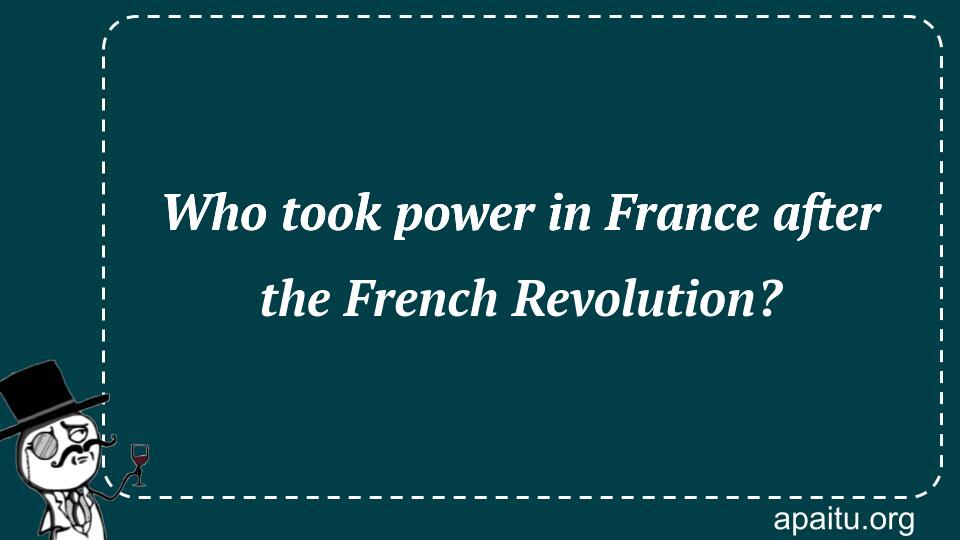Question
Here is the question : WHO TOOK POWER IN FRANCE AFTER THE FRENCH REVOLUTION?
Option
Here is the option for the question :
- Louis XIV
- Napoleon Bonaparte
- Cardinal Richelieu
- Marie Antoinette
The Answer:
And, the answer for the the question is :
Explanation:
The French Revolution was a watershed moment in European history. It abandoned the mediaeval feudal system and its emphasis on aristocratic authority in favour of a more free society based on individual rights, governed by the National Assembly. The revolution lasted from 1789 to 1799, when Napoleon Bonaparte formed his consulate as France’s ruling authority after a period of instability.

The French Revolution, one of the most transformative periods in European history, brought about a seismic shift in France’s political landscape. It marked the end of the monarchy and the rise of a new era defined by revolutionary ideals. Following the tumultuous events of the Revolution, it was Napoleon Bonaparte who emerged as the dominant figure, ultimately taking power in France and leaving an indelible mark on the nation’s history.
Napoleon Bonaparte, a military genius and astute politician, rose to prominence during the French Revolution. Born in Corsica in 1769, he quickly climbed the ranks of the French military, displaying remarkable talent and strategic acumen. With his victories on the battlefield and his charisma, Napoleon gained widespread acclaim and support.
In 1799, amidst political instability and the disintegration of the revolutionary government, Napoleon seized the opportunity to assert his authority. He orchestrated a coup d’état, overthrowing the Directory—a five-member executive body—and establishing himself as the First Consul of France. This marked the beginning of Napoleon’s ascent to power.
Napoleon’s consolidation of power was not limited to his military prowess. He embarked on a series of reforms and instituted sweeping changes that aimed to stabilize the nation and consolidate his authority. The reforms, collectively known as the Napoleonic Code, revolutionized France’s legal system, establishing equality before the law, protection of property rights, and religious tolerance. These measures won him support from various segments of society and helped solidify his position.
In 1804, Napoleon took a decisive step by proclaiming himself Emperor of the French. This marked a significant departure from the republican ideals of the Revolution, as Napoleon positioned himself as a hereditary ruler. His coronation as Emperor Napoleon I signaled the establishment of the Napoleonic Empire, with France at its core.
Napoleon’s rule was characterized by both domestic reforms and ambitious military campaigns. He sought to centralize power, modernize France’s institutions, and promote economic growth. His policies touched upon various aspects of society, including education, infrastructure, and the arts. The establishment of the Legion of Honor, an order of merit, exemplified his effort to reward meritocracy and honor individuals who contributed to the nation’s prosperity.
On the international stage, Napoleon’s military conquests reshaped the European map. He embarked on a series of campaigns, seeking to expand French influence and spread revolutionary ideals. From the Battle of Austerlitz to the Peninsular War and the disastrous invasion of Russia, Napoleon’s military victories and defeats shaped the course of European history.
However, Napoleon’s ambitions eventually led to his downfall. The coalition of European powers aligned against him, and his military campaigns became increasingly challenging. In 1814, after a series of defeats, Napoleon was forced to abdicate and was exiled to the island of Elba. But his exile was short-lived.
In 1815, Napoleon made a dramatic return to France in what is known as the Hundred Days. He briefly reclaimed power but was ultimately defeated at the Battle of Waterloo. This marked the end of his rule and his final exile, this time to the remote island of Saint Helena in the South Atlantic, where he died in 1821.
Napoleon’s impact on France and the world cannot be underestimated. His legacy extends far beyond his military conquests. The Napoleonic Code, with its emphasis on legal equality and protection of individual rights, influenced legal systems worldwide. His administrative reforms laid the groundwork for modern governance. The centralized bureaucratic system he established in France served as a model for future governments.
Napoleon Bonaparte took power in France after the French Revolution, emerging as a dominant figure during a time of political upheaval. Through his military successes, political maneuvering, and ambitious reforms, Napoleon reshaped France and exerted a significant influence on Europe. While his rule was marked by both triumphs and failures, his impact on France’s institutions, legal system, and governance continues to reverberate to this day.